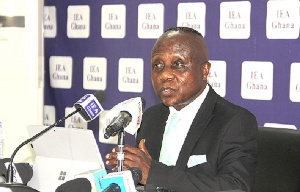 John Kwakye, Director of Research at the Institute of Economic Affairs
John Kwakye, Director of Research at the Institute of Economic Affairs
Director of Research at the Institute of Economic Affairs, Dr. John Kwakye, has warned that the implementation of the Electronic Transactions levy (e-levy) will lead to triple taxation of consumers.
Describing the levy as an “innovative idea to scale up revenue mobilization,” Dr. Kwakye however argued that the broad application of the levy will subject income earners who are already paying taxes to multiple taxations, defeating the purpose for introducing the policy to capture the informal sector.
Addressing the subject at a post-budget analysis forum organized by the IEA, Dr. Kwakye said, “A lot of persons and businesses who are being called upon to pay the e-levy are already in the formal sector, hence within the tax net, and are already paying personal income tax, corporate income tax or consumption taxes.
“To ask them to pay the e-levy on MoMo transactions on top of what they pay to the telcos, to us, seems to amount to subjecting them to ‘triple taxation’.”
Dr. Kwakye noted that some transactions, such as bank transfers and inward remittances are already taking place in the formal sectors, hence they cannot be categorized as activities in the informal economy.
He added that since telcos, financial institutions and the state are the biggest beneficiaries of the exponential growth in digital transactions, they ought to share the chunk of the levy burden.
Recalling the reasons cited by the minister of finance to introduce e-levy, Dr. Kwakye said merely looking at the surge in digital transactions which hit over GH¢500 billion in 2020 for taxing could be misleading.
“Who is the beneficiary of this surge? It is certainly not the customer but rather the telcos (through fees and charges) and the government (through taxes). Why is the government then levying the customer and not the telcos?” he asked.
Dr. Kwakye said the new levy, coupled with existing service charges would be too high and might serve as a disincentive for some users of digital financial services.
In as much as the State is betting big on the levy, with projected receipts pegged at GH¢ 6.9 billion, roughly half of expected VAT revenue, Dr. Kwakye called for a review of the rate.
“Customers will be paying the 1.75 percent levy on MoMo transactions in addition to the 1 percent already levied by the telcos, bringing the total levy to 2.75 percent. This is very high,” he said, as he proposed a downward review of the e-levy to 0.5 percent, bringing the total rate borne by senders to 1.5 percent.
He also urged the state not to earmark revenue from the levy to specific targets, arguing that it could result in expenditure rigidity.
“We would rather the proceeds from the e-levy are paid into the consolidated fund pool to be disbursed in a flexible manner,” he suggested.